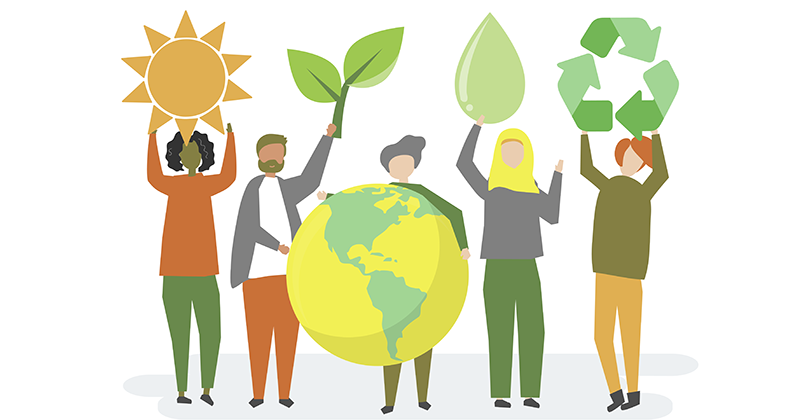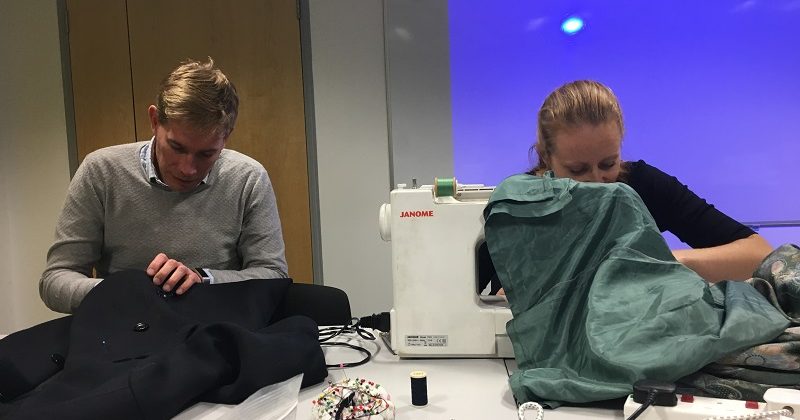
Last month the Secretary-General of the UN announced that 2021 is a ‘make or break year’ for collective action, and called for a global coalition to commit to net-zero emissions by the middle of the century. Over the past year, there have been calls for evaluators to step up and take responsibility to respond to the environmental crisis. So, what is Itad doing?
The Itad Green Team
In 2019, we introduced the Itad Green Team – a team of colleagues dedicated to making Itad a greener, more environmentally sustainable organisation. We started out with a range of internal grassroots initiatives – from improving recycling and running staff awareness campaigns on topics from waste to fast fashion, to moving towards meat-free lunches as default and putting PINs on our printers to reduce paper waste.

Early last year we began setting our sights higher and started to confront the big ‘elephant in the room’ in an international development consultancy: international flights. In most years, flights are by far our largest source of emissions, responsible for 700 tonnes of CO2 in 2019. This is equivalent to the annual emissions of 119 people living in the UK, or 6,780 people living in Ethiopia.
A greener ‘new normal’
When the Covid-19 pandemic hit and international travel ground to a halt, we pivoted to remote ways of working, and increasingly relied on our network of international partners to lead our work around the world. We saw this as an opportunity to think through what a greener ‘new normal’ might look like when travel becomes possible once again.
We also started thinking more broadly about how to build on the grassroots work we’d already started to embed greener ways of working into our organisational DNA.
We are excited to share our latest thinking on how we intend to play our part in tackling the climate emergency, and two commitments we will publicly hold ourselves to.
We are proudly committed to the Ten Principles of the United Nations Global Compact, and our climate commitments are enshrined in our latest report on progress.
1. We commit to becoming a ‘net zero’ company by the end of this year, and ‘carbon negative’ by 2023.1
Over the coming months, we will measure Itad’s emissions to understand the biggest carbon culprits across the organisation. We will look for opportunities to continually reduce our emissions within our office, our operations and our projects and will set targets to hold ourselves to account.
We’ve started reviewing our systems, policies, plans and values to ensure environmental sustainability is reflected in all our processes – for example building a CO2 calculator into our budgeting templates, and updating our travel and environmental policies. And we commit to continually reducing our reliance on international travel.
This means increasingly empowering our national partners to lead our international work, and continuing to develop our tools, skills and technology to work remotely.
Finally, we will balance our remaining hard-to-eliminate emissions by investing in projects that mitigate emissions and store carbon elsewhere, while benefitting ecosystems and communities. Importantly, we see offsetting as a ‘last resort’, not as an excuse to continue with business as usual.
2. We commit to sharing our knowledge and learning as widely and openly as possible. On the one hand, this includes sharing learning and evidence from our climate and resilience work – for example, our webinar on the recently completed evaluation of the UK’s International Climate Fund (ICF), and our recent Think Piece on evaluating transformational change.
On the other hand, we’ll also share our learning on how to do ‘green’ monitoring, evaluation and learning (MEL), as openly as we can, with our clients, our partners and the wider world.
We don’t claim to have all the answers – far from it – but we hope we can help others on their journeys to more sustainable ways of working and learn from others too.
The first resource we’d like to share is our guidance on ‘How to run a greener project.’ This includes several ideas for reducing reliance on international travel and is used by our consultants to help plan how to reduce emissions in new and existing projects.
Mainstreaming environmental sustainability
Finally, we have begun thinking about what it might mean to consider environmental sustainability in all of our projects, not just our climate change work. While we don’t have easy answers on how to do this just yet, we know it is going to become increasingly important in the coming years.
For example, this is reflected in the new ‘social value’ guidelines recently published by the UK government, which require everyone bidding for a public contract to build in a consideration of social value including ‘fighting climate change and reducing waste.’
As we make progress in the coming months, we will share further updates and insights through our website and social media. We are excited to share more details soon on our work to measure and balance our carbon emissions.
Share your experience
We’d love to hear how you’re responding to the climate emergency within your work or organisation. Do you have a Green Team or equivalent? How are you changing your thinking and ways of working? And what do you think of our ideas and commitments?
If you have thoughts or ideas to share, please email the Green Team at mail@itad.com.
Read about our work on climate change and apply to join our climate change team now.

